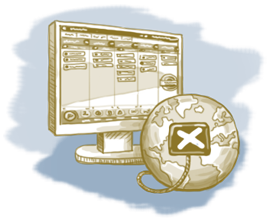 When CRM solutions first came on the market, they were much of the time an afterthought.
When CRM solutions first came on the market, they were much of the time an afterthought.
A company and sales force were more or less operating on some kind of established pattern of sales, and the CRM application came in after the fact.
CRM did little to nothing to actually enhance business and sales processes—it merely functioned as a method for management to measure sales progress, and didn’t even do that adequately. For the sales force, it was just something else that took up valuable selling time instead of being any kind of valuable tool.
Unfortunately traditional CRM systems, despite all their “bells and whistles” of advanced technology, have not made the necessary changes to become the streamlined tools they need to be. It’s a sad fact that today many CRM solutions are little more than “numbers trackers” which reflect various quantities as sales are made. This puts sales management at a disadvantage as it doesn’t have hard data with which to manage.
In today’s highly competitive business environment, a CRM solution must be far more than a complex method for measuring potential and accomplished quota achievement. In fact CRM and it’s sales pipeline needs to be the backbone, memory and mind of a sales force and all who must interact with it:
Enter Quality, Not Just Quantity
What if a sales rep was only required to call up a prospect, spill out a pitch like some kind of robot, and mark down that they had done so? Would that prospect move forward to a sale? Most assuredly not—yet it is that kind of activity most CRM applications measure. While the quality of that conversation is assumed, it is not actually taken into account in the CRM application at all.
Yet it is the quality of the salesperson’s skillful handling of a prospect and moving that prospect along the sales pipeline that will actually bring that prospect to a close. If this quality is not clearly reflected in sales analytics, sales management is missing a very important part of the story.
In these times a CRM application must be of considerable assistance to sales management in helping salespeople sell better. The only way that’s going to happen is if there are metrics that reveal quality as well as quantity.
What Kind of Metrics?
A sales force working through an established and proven sales pipeline process is a dynamic thing. It is a human operation, it is alive. Therefore trying to measure it as one might measure gizmos coming off a factory assembly line is not going to make it.
For sales management to get an idea of quality, there should be metrics such as closing ratios (both for individual reps and for the entire sales force); profit margins; and length of sales cycles. These types of measures should also have established averages so that it can be seen whether a rep is ahead of or behind an average—not just ahead or behind of others in the sales force. And, of course, such metrics should be applied at each step of the sales pipeline.
The problem with “quantity only” type measures is that the sales manager is unable to see how a sales rep needs to be corrected in their approach—until it’s seen that the salesperson is not meeting a quota. With quality metrics, the sales manager is able to step in before a sale has gone too far off the rails. Sales management is then ahead of the curve instead of behind it.
Incidentally, these types of measures can be applied more broadly beyond the close, for the sales process in actual fact extends beyond the close into delivery or installation and customer service and support. Having quality measures for these activities is an important indicator of potential repeat business, referrals and your company’s future reputation.
Choosing Your CRM Solution
Given all the information above, it can be seen that a CRM solution must exactly mirror a company’s sales process, so that sales management and the sales force are “on the same page.” That CRM application must also empower the company to establish correct metrics for each stage of the sales pipeline as well as the overall pipeline.
Ideally the CRM solution should be chosen and implemented after a sales process has been evolved. But in that this is the real world, many companies will find they need to jettison their outdated CRM application and replace it with an intuitive, flexible leading-edge CRM solution that will actually empower sales management, the sales force and the entire company. The time, effort and funds expended for doing so will pay off many times in the long run.
Get your CRM sales pipeline solution measuring quality as well as quantity—and start consistently meeting or exceeding your sales quotas.
See our other articles on CRM solutions, sales management and sales analytics.




















